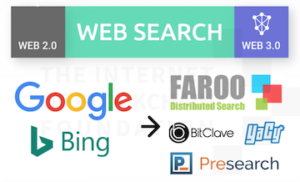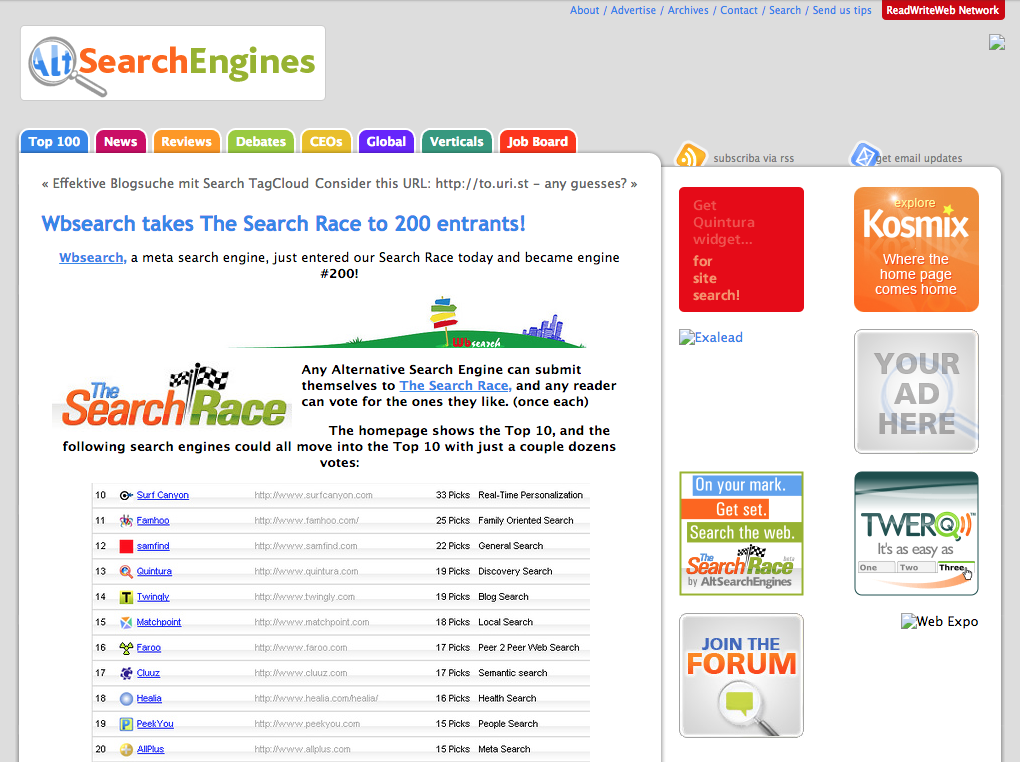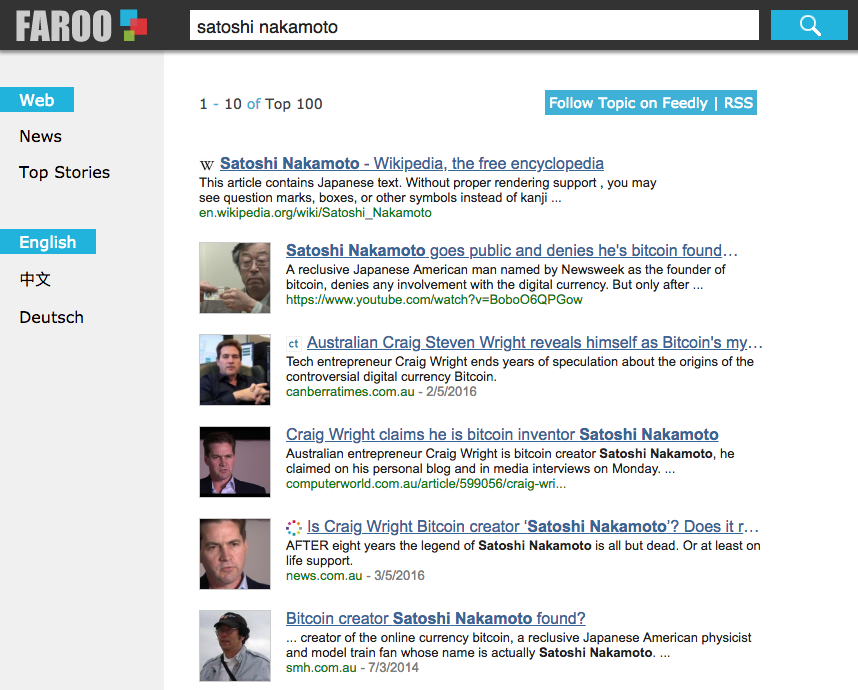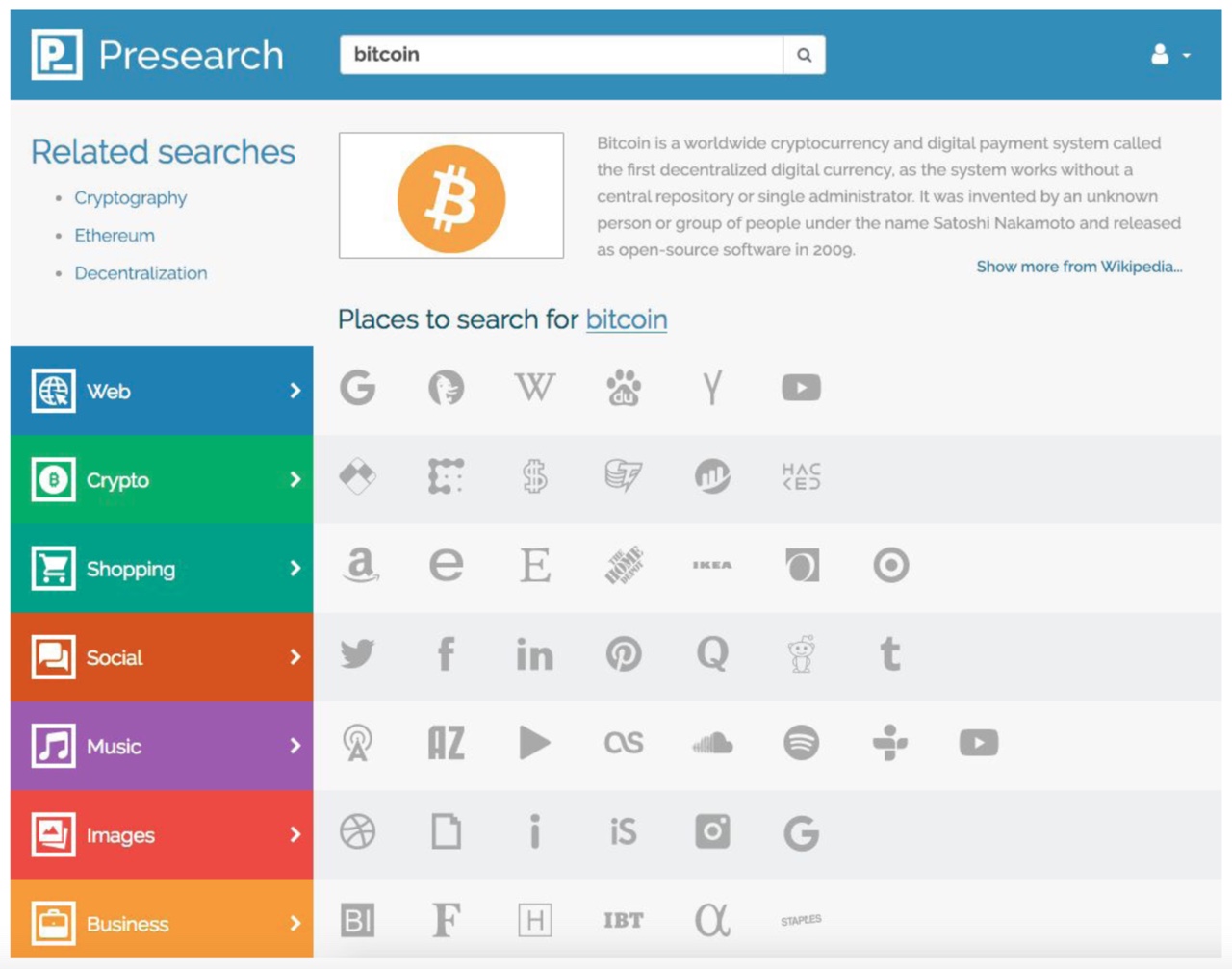After Facebook’s sudden fall in popularity this month, people have begun to talk more seriously about creating decentralized versions of various Web 2.0 mainstays.
Matteo Gianpietro Zago, whose company Essentia runs a decentralized developer platform, went so far as to create a large map of “Web 3.0” startups. Here, for example, is how he compares the main Web 2.0 search products (by which he means Google and Bing) with some up-and-coming distributed search engines:

It didn’t used to be just Google and Bing. At the height of Web 2.0 there were hundreds of alternative search engines. Some were trying to usurp Google, but most were more realistic and served a particular niche. The Web 2.0 search engines were so prolific that my previous site, ReadWriteWeb, added a specialist blog to our network to cover the market. It was called AltSearchEngines and even maintained a top 100 list, as this screenshot from Wayback Machine shows:

Many of those alt search engines didn’t make it into the current era, largely due to Google’s ever-increasing hold over the market. But for a while it was great to see so much innovation happening in search.
Clearly we’re very far having hundreds of decentralized search engines. But as Zago’s map shows, there are several to check out now.
Interestingly, the first one he lists – Faroo – is a dinosaur from the Web 2.0 era. It even featured on AltSearchEngines back in 2007.
Faroo doesn’t use blockchain, but is decentralized in the traditional peer-to-peer manner. It stores search data on the computers of users, rather than on a central server. According to Wikipedia, whenever a user visits a website it is automatically indexed and distributed to the network.
Unfortunately, in my tests Faroo’s results were underwhelming. A search for Satoshi Nakamoto, for example, threw up old and mostly wrong articles:

YaCy is also listed in the Web 3.0 graphic, but it too is a Web 2.0 p2p site. Since you need to download an app to run it, I skipped that test.
Let’s move to the blockchain search engine wannabes.
BitClave held an ICO late last year and raised $25.5 million. However, like most other ICOs, BitClave doesn’t have a functioning product yet. Only a white paper. So we don’t know how good its search engine is. Indeed, after browsing the website and 51-page white paper, I’m still unclear on what exactly BitClave does.
The key idea is that BitClave allows users to get compensated for their searches. There is some kind of hookup between users and retailers, using BitClave’s CAT token (Consumer Activity Token). This system supposedly takes out the middleman (i.e. Google) and allows retailers to reach consumers directly. It’s all rather vague, as the following promotional video shows:
Based on the most recent update on its blog, the company appears to be a ways away from releasing its product. So colour me skeptical on BitClave so far. But if you’re feeling more optimistic than me, you can buy its CAT coin for between $0.02-0.03. BitClave’s market cap is listed at US$13 million, for what that’s worth.
Finally, we have Presearch. It’s described as “a decentralized search engine, powered by the community.” Presearch does have a product, a closed beta. However, I soon discovered there’s a catch. The actual search technology has not yet been built. What’s available is basically a Presearch UI that connects to existing search engines (and Google is the default). Here’s how they word it in the white paper:
…a decentralized search engine being the long-term goal, and with a semi-decentralized search tool that leverages existing search engines in the short-term.
So, as with BitClave, there’s a big gap between the blockchain vision outlined in the white paper and the current product reality.

As with BitClave, Presearch ran a token sale last November. It netted $20.5 million and the PRE token is currently worth about $0.18-0.19. The market cap is just over $29 million, so it’s over twice the perceived value of BitClave.
The reality is, Google has nothing to fear from any of these companies. For a start, both BitClave and Presearch haven’t built their search engines yet. They’ve only described them in white papers. And in BitClave’s case, described them pretty vaguely.
Also, the main reason why Google vanquished all those Web 2.0 alt search engines is because its algorithms became unbeatable. Google’s search results are a cut above any other competitor, then or now. I don’t see that changing any time soon.
So the blockchain search engine is, for now, pie in the sky. But I’ll check back in when there are actual products to test.

